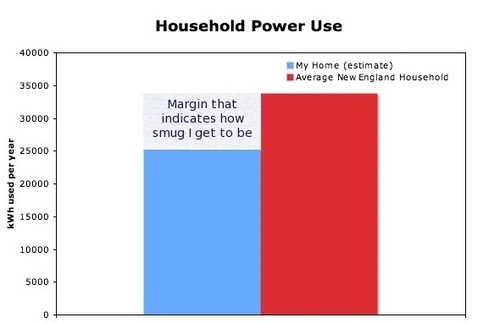The average New England household uses 115.3 million BTUs (33,700 kWh) per year.
I estimate* that my household uses 86.5 million BTUs (25,300 kWh) a year.
*This is probably an overestimation because I approximated my energy use by taking the average of the past five months multiplying it by twelve. So the sample contains a disproportionate amount of power-sucking winter months.

Okay, so I'm not really that glib about it. That graph might make a neat conversation piece at the next neighborhood potluck, but I'm not competing against the average household. I'm competing against myself.
This brings me to the point of today's post. The first half of my trek into learning about energy use and conservation is complete. I wasn't able to track the power use of every appliance in my home and workplace, but I did get a look at some of the numbers and I'm eager to embark on week two: the conservation phase.
I'm tackling this week head on--I've decided to try a whole bunch of energy-saving tips at once. That means it'll be hard for me to tell which measures save the most energy, but it's pretty likely that I'll see a result. Tonight I'm going to.
•Lower my hot-water heater temp. by 10ºF
On their website, the DOE suggests that doing this can save three to five percent of your energy cost. Right now we keep the heater set at 125ºF. So I took a thermometer into the shower with me this morning to see if I'm maxing out the heat at any point. I measured the water at 105ºF, and I'd guess that I wash dishes at the same (or slightly warmer) temperature. So I don't think it'll kill me to lower the water heater from 125º to 115º. We'll see if my roommates notice the difference.
•Weatherproof my windows with plastic sheeting
I'm a renter, which means that my house is poorly insulated, the windows let cold air in, and I'm not in a position to do much about it. But I know how to install plastic sheeting. It doesn't offer the kind of comfort you'd get from an insulated storm window, but it will block breezes. Here's a quick way to test and see if your own windows could benefit from a similar treatment: Hold a lit stick of incense near the sill. If the smoke quickly blows away, you probably have a leaky window. I didn't need to pull out the incense to see how leaky my own windows are. On windy nights, the curtains move.
•Switch out the last of my incandescent lightbulbs for CFLs
I still have some reservations about the mercury in Compact Florescent Lights, but it looks like the lights are the most inefficient things in my room, so I'm making the change. Hopefully by the time I need to replace the bulbs retailers will have in-store recycling programs, just like they do for batteries and paint.
•Lower the thermostat
The Energy Star website suggests that lowering the thermostat by five to eight degrees before leaving home for a few hours will save energy (and money). My roommates are on board for this one, but we're rarely all home-or all away from home-at the same time, so I'm not sure how much this will help.
Over the week I'll try to:
•Take shorter showers
•Turn out lights when I leave a room
•Wash clothes in cold water
•Use a toaster oven instead of an oven where applicable
•Cover pots while boiling water or cooking, and match my pot to the burner
These are simple, commonsense, commonplace changes. None will cost much money or cause major inconvenience. It's just a matter of breaking old habits and building new.
My plan to conserve energy at work isn't anywhere near as elaborate. I'll take the stairs instead of the elevator (even though I haven't figured how much energy that'll save, if any), and I'll be trying a few tricks to decrease the amount of energy used by my computer. In terms of transportation, I don't have much room to improve. More on that tomorrow. Don't forget to tune it to PBS at 8 pm tonight and check out the show.


Hi,
I just wanted to let you know that the Home Depot has a free CFL Bulb recycling program at all stores nationwide.
http://www6.homedepot.com/ecooptions/
I like what you're doing. If we all took active steps to consume less energy we would collectively make a huge difference. You don't need to invest in solar panels and a Prius to save energy.
Good Luck,
Stu
Thanks for letting me know, Stu. Since the post, I've also found http://earth911.com/ At Earth911, you can type in the name of what you want to dispose of and your zip code and it maps out where you can do so.
I'm relieved to find more places to get rid of my hazardous trash. If I don't know where to take it, I end up carting it around. When I can't find somewhere to return my batteries, for example, I'll keep them in my messenger bag pocket, which can't be good for anyone.
I tried reading the data that is linked--I have no idea what it is trying to communicate.
I don't express natural gas consumption in kWh. What is the conversion from cf to kWh? I would post a comparison of my home in Houston, TX to these if I knew that. (Electric consumption is under 6500 kWh/yr; only other energy source is nat gas, and I don't use a lot of that, either.)
Greg,
I'm not sure what unit cf is, but you can use this online tool to convert from Therms (that's what my natural gas is measured in) to BTUs to kWh. (Or convert your electricity use to BTUs)
http://www.onlineconversion.com/energy.htm
The data table lists the average value for your area (the West South Central census region) as 89.5 million BTU per household. To confirm, click on the link, select the PDF for the West South central region and look under "Total BTU Consumption Per Household, Fuels Used: "Total (excludes primary electricity and wood)"
Our electric consumption was pretty low too--just over 2000 kWh/yr. It's the gas heat that really cost us.
cf = cubic foot. My nat gas is billed in hundreds of cf, or ccf (it makes sense since I'm buying a quantity of fuel, like a gallon of gas, and that is what is the meter measures).
I will have to check my statements to see my actual totals, but a quick estimate based on gas cost adjustment and my average bill amount would put my nat gas consumption at around 8500 kWh/yr.
I couldn't find explanations of the terms in the report--I don't know why "primary electricity" is excluded from the total amount, or even what "primary electricity" is.
But comparing the costs & consumptions of electricity and 'fuels' has a potentially huge flaw--electricity & fuel are apples & oranges. Either we should measure the energy extracted/used from the fuels or we should measure the fuel that goes into making the electricity.
For example, a nat gas power plant will produce electricity with at best 50% efficiency--half of the fuel energy cannot be captured. Also, there are losses due to transmission. The electricity numbers should reflect the amount of fuel needed to produce that amount of electricity since that is what really has to be consumed.
An update: my natural gas consumption for the last year was 121 ccf (hundred cubic feet), which equates to 3650 kWh, for a total annual household energy consumption of 10,150 kWh, compared to the regional average of over 26,200 kWh.
My home was built in 2002, so it has many more energy mindful features than older homes (the data is from 2001, IIRC). However, this does highlight the impact that updating our buildings can have.
Historic old homes, such as those seen on _This Old House_ consume considerably more energy than newer buildings, and there are millions still in use. Retrofitting them to improve energy efficiency not only would reduce our dependence on fuels and ease the demand on the grid, but may also prove to be economical with a shorter break-even point than most realize, especially with rising energy costs.
Also, increasing the percentage of our electricity supply that comes from renewable sources (such as wind and solar) can be accomplished not only by building more renewable sources, but also by decreasing how much total electricity we use. (The current renewable sources won't go away, but traditional power plants can be shut down more often.)
Very good work from all of you. Keep it up!
For comparison. In our 2 person household, a condo with 815 sq ft, heating is electric, we're using 6300 kWh electricity/year after our efficiency efforts. Before we used 9300 kWh, so we save over 30% or $600!
In the future we would like to install a new heatpump water heater and a mini split heat pump for heating. Our energy use should then drop to 3400 kWh/year (including heating and everything else)!
An important thing everyone can do is buying 100% green energy. This will change the energy landscape the fastest way possible. Vote with your dollars.
Rachel, don't forget to install low flow shower heads and to insulate the hot water pipes and the hot water tank. Other big savings come from air sealing: especialliy plumbing and electricity penetrations in the basement ceiling and in the ceiling to the attic (recessed lights). Also install install electric switch and plug sealers. Eleminating standby power is also a big thing. Everything that is using a little but is running 24/7 has a big impact. And many other things.
The results in our household:
In January 2008 we used 55.17 kWh/day (heating)
In January 2009 we used 45.10 kWh/day (heating)
In January 2010 we used 40.38 kWh/day ($70/month less than 2008!)
In August 2008 we used 12.01 kWh/day
In August 2009 we used 5.97 kWh/day
In August 2010 we will use around 5.5 kWh/day
Here you will find very good information:
http://www1.eere.energy.gov/consumer/tips/pdfs/energy_savers.pdf
A very good book for $3 to $10 is: Cut Your Energy Bills Now: 150 Smart Ways to Save Money & Make Your Home More Comfortable & Green by Bruce Harley
And that's where the biggest payback is for me - more comfort during the chilly New England winters!